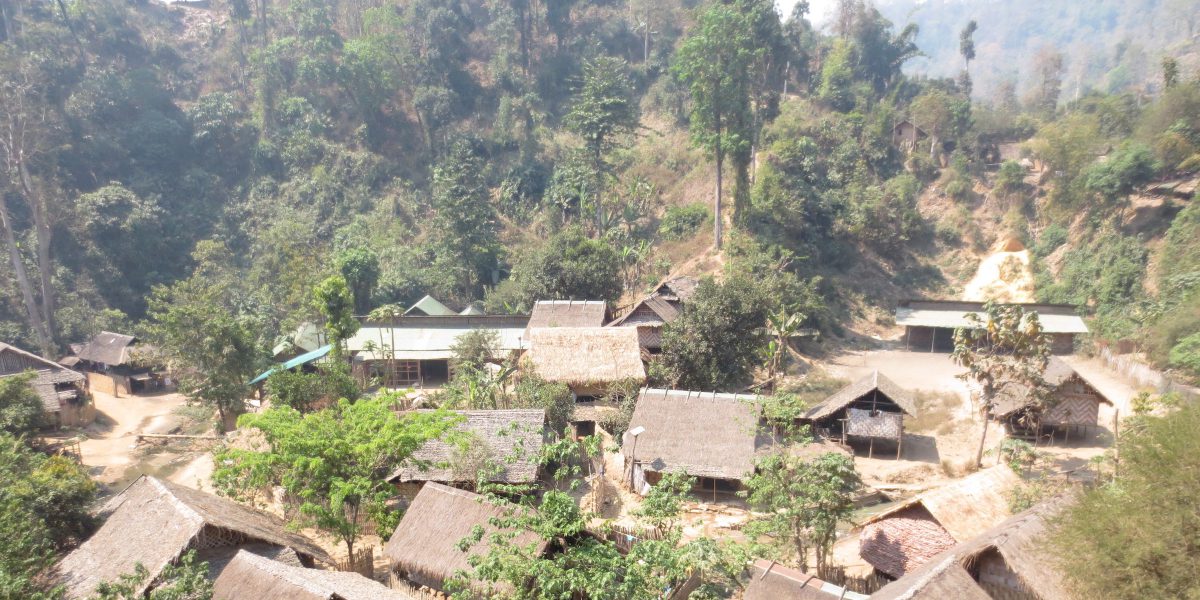Myanmar – Thailand: Weaving the future by fostering understanding
11 April 2017

Mae Hong Son, 11 April 2017 – The future is never an easy question to deal with, mostly because it is unknown territory for most of us, and I can see that clearly after I met refugees in the Mae Hong Son camps. I saw their dejected faces and they felt emotionally downhearted when I met and talked with them. I even realized how a seemingly clear future of being granted resettlement can turn into another incident of waiting as I heard of two families having to return to the camps due to the executive order of the US President in January this year. My colleague from JRS Loikaw said he noticed a lack of confidence among them after he had a small chat with a few of them during our meeting.
Weaving the Future
Our visit to the camp now was part of a coordinated meeting and joint effort between JRS Mae Hong Son from Thailand, and JRS Loikaw from Myanmar to prepare for the possible future return of refugees from Mae Hong Son camps. The first coordination meeting took place in November last year in Myanmar with three JRS Mae Hong Son staff meeting with organizations working in Loikaw, the Kayah State Education Department, and of course myself and Mariano who are part of JRS Loikaw. This past February was our chance to visit the refugee camps, the first time for both of us to meet people of our own ethnicities who had fled to the Thai – Myanmar border because of conflict.
I experienced war directly in Kayah State in the 1990s and the suffering of the people fleeing their houses and having to stay in the IDP camps. I know some people fled from Kayah State while some others stayed. I did not flee the war and cross the border to live in a refugee camp, this was my first time to visit the refugee camps in Mae Hong Son, Thailand.
It was the first time for me to have direct exposure to people who had fled our home state. It was also a beginning for me to cross over the gap of what their absence was to so many of us who had stayed. Some of them are my relatives, distant relatives, or students I worked with. Many of them, the young generation in particular, are not known to me and have never even been or even know Kayah State.
Challenging Moment
As we arrived in the camps, I was informed their houses are small huts that are close to each other on the slope of the hills. It is an hour journey from the center of Mae Hong Son with either a dusty road during dry season or a slippery muddy road during the rainy season. I had a hard time moving from one hut to another and I can imagine others may have had some problems or maybe not as they are used to going up and down the hills for daily routine tasks. I also learned that three years ago there was a big fire that consumed many huts and killed 30 people. It was unbelievably sad and shocking for me to learn how much they have to overcome and to cope with such a hard life in the camp.
The refugees in the camps depend on international support for their daily needs in the camps such as food, shelter, health and education. They are not allowed to work outside the camps and are confined to move only within the camps. I understand their worries of being dependent on food rations and aid because I know that this is not a sustainable way to live. Some communities can stay outside the camp, a long neck tribe, to create “a long neck village” and earn money from tourists in Mae Hong Son. But how to end this encampment when peace talks have not reached the final stage to guarantee their safety and dignity upon return to their home land. On top of that, I wonder how the community who stayed in Kayah state, my community, will provide them with a livelihood or a job opportunity.
My colleague had a discussion with two high school students who are in their final year of high school. They asked questions about the situation, the education system and its quality in Myanmar, with some practical questions regarding the possibility of continuing their higher education with universities in Kayah State. Pursuing higher education is a priority for some students in the camps, with the challenges being recognition of their camp based education. Listening and observing all of what goes on in the camp, I see a challenging moment for both JRS Mae Hong Son and JRS Loikaw to work for the greater good of these people.
Fostering Understanding
Our visit helped us to understand the reality of the people JRS Mae Hong Son has been accompanying and working with for more than twenty years. The work of JRS in education is fundamental to keeping the fire of learning going among the second and third generation of refugees in the camps. It also helps to lay a foundation that learning and knowledge are about a process of widening horizons and fostering understanding.
The long absence and separation between these refugees in the camps and the people who stayed in Kayah State, like my JRS Loikaw colleague and I did, is the sense of separation where misunderstandings and negative perceptions on both sides can prevent a mutual understanding of what happened to us. Expanding horizons by a direct encounter with those whom I have long been separated is an important step to make.
It will foster an understanding during a time where division and misleading information is overwhelming. Listening to each sides stories to create a platform for fostering understanding is necessary and an important step.
By Rosemary, JRS Myanmar Staff


